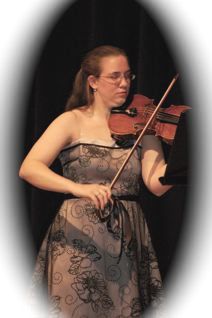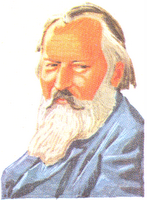From Paul Jackson, 10/04/06
Subject: Slate Article: Classic Put-Downs
music box Classic Put-Downs Was Brahms a wiseass? By Jan Swafford Posted Monday, Oct. 2, 2006, at 5:18 PM ET
Among those celebrated for their eloquence in the art of music, especially instrumental music, it's worth noting how well they wielded the foreign art of language. It's not surprising that the prose efforts of some certified greats—see Beethoven's letters—were clunky in expression and uncertain in grammar. But a surprising number of composers have been in one way or another handy with words. One of those was the master ironist Johannes Brahms.
Cutting irony was a prime Brahmsian mode, and he wielded his wit with special gusto when skewering friends. He was master of the quick putdown. During a rehearsal of a quartet of his, the violist asked if he liked their tempos. "Yes," said Brahms. "Especially yours." When Max Bruch had played through his giant oratorio Odysseus for Brahms and turned eagerly for a response, Brahms observed only: "Hey, where do you get your music paper? First rate!"
It was not easy to be a fan of Brahms. He hated effusive praise from strangers. At parties mounted by friends, the guest of honor would preside in the middle of the fray, downing ham rolls and mugs of beer, and have at anyone foolish enough to approach him: "Did the gracious lady have all those beautiful feelings thanks to my poor quartets? And where did they lodge? Beneath the little blue shawl? Or maybe under the bird on her hat?"
Sometimes he went easy on his victims. When a lady gushed to him, "How do you write such divine adagios?" he only shrugged, "My publisher orders 'em that way." Once a singer asked which of his songs he might recommend. With straight face, he advised her to try his posthumous ones. "And which?" she asked politely. That was too good; he had to spread it around. "Ask Kalbeck," he told her. "He knows everything." So, she did go and ask his friend and future biographer Max Kalbeck to recommend some of Brahms's posthumous lieder, inspiring Kalbeck to collapse with laughter. When the lady appeared afterward in a huff, Brahms was, for him, kindly: "Dear lady, don't ask me such things. I'll usually just make some sort of a joke—and if a good one doesn't occur to me, then a bad one."
One of the charming, also telling, things about Brahms' wit was that he didn't spare himself. He had many friends but in company remained the eternal loner; he enjoyed acclaim but anguished over his inability to measure up to the giants of the past. At a dinner in his honor, the host introduced a bottle with, "I call this the Brahms of my wines!" "Well," said Brahms, "let's have a bottle of Bach then." He wrote a glum note to Clara Schumann reflecting on the neglect of the Mozart concertos: "The fact that the public in general does not understand and appreciate the best things is the reason people like me get famous."
Late in life, when Brahms had returned from one of his working vacations, Kalbeck asked him what he'd produced over the summer. Perhaps a new string quartet? "God forbid, nothing so grand as that!" Brahms exclaimed. "Once again I've just thrown together a bunch of polkas and waltzes." He was referring to the epically gloomy Fourth Symphony. That crack reveals two significant things about Brahms. One is that the pieces closest to his heart were the ones he was most apt to put down. And a Brahms joke often had a serious point buried in it: The Fourth Symphony is not a bunch of polkas and waltzes but a tragic work expressed largely in solemn and mournful dances.
Brahms' wounding irony, his obliqueness in all things, were part of the armor of a relentlessly private man. So was the famous beard. The whiskers he grew in his mid-40s changed his appearance so much that he became almost unrecognizable. To get some mileage from that, he took to introducing himself to acquaintances as "Kapellmeister Müller from Braunschweig," and seeing how long they took to catch on. His friend Gustav Nottebohm spent a whole evening conversing innocently with "Kapellmeister Müller."
Nottebohm, a Beethoven scholar, was also the victim of one of Brahms' most devious practical jokes. On a scrap of old music paper, Brahms jotted down a current pop tune in an expert imitation of Beethoven's handwriting, then bribed a street vendor to wrap the manuscript around a sausage and sell it to Nottebohm. Brahms was thrilled to see the old pedant unwrap the sausage, step under a streetlight to examine the paper with eyes popping, and with a furtive air slip it into his pocket, finishing the greasy sausage barehanded.
Perhaps the masterpiece of Brahmsian irony in prose is a letter he wrote to his friend and champion Eduard Hanslick, a famous Wagner-bashing critic. Brahms had perused Hanslick's Beauty in Music, a classic exposition of the doctrine of "pure music," of which Brahms was considered the great exponent. He wrote Clara Schumann of the book, "I found so much stupid stuff in it that I gave it up." Yet he later wrote Hanslick:
I must send you my sincere thanks for your book Beauty in Music, to which I owe many hours of enjoyment. ... Every page invites one to build further on what has been said. ... But for the person who understands his art in this manner, there are things to be done everywhere. ... I will wish we might soon be blessed with such excellent instruction on other subjects.
Hanslick proudly cited this letter in a memoir. Now, Brahms was a brutally honest man, with himself and others. He despised hypocrisy and lying. Was he being a hypocrite with Hanslick? Not as such, no. The letter is a marvelously subtle dismissal. "Every page invites one to build further," i.e. You don't go very far. He hopes for "excellent instruction on other subjects," i.e. Don't write this kind of thing anymore; you're not the man for it.
Is Brahms' irony reflected in his music? Perhaps not, though sunlight turns up in his generally dark-hued work more often than one might think. First hearing the ebullient opening of the G Major String Quintet, Kalbeck exclaimed, "Brahms in the Prater!" meaning the famous Vienna amusement park. "You've got it!" Brahms replied, adding roguishly, "And all the pretty girls there, eh?" But Haydn and Mozart had been the masters of irony in music, and Beethoven had his distinctive rough jokes, and Brahms did not try to challenge them.
On his deathbed, fading with cancer, bleary with morphine, Brahms did not lose his wit. When his housekeeper got him up for sessions at the washstand, he called it "bathing with police escort." Finally, he barked at her, "You want to give me my last bath? I'm not a baby!" In tears, she replied that she was just trying to save him trouble. Brahms relented and whispered, "You're a sensible woman. One can negotiate with you." Shortly after that last, gentle joke, he died.
~Jan Swafford is a composer and writer living in Massachusetts. He is the author of Johannes Brahms: A Biography and Charles Ives: A Life with Music.


